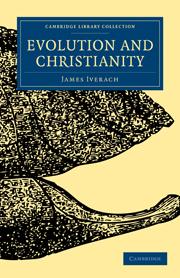Book contents
- Frontmatter
- Contents
- CHAPTER I EVOLUTION AND BEGINNINGS
- CHAPTER II EVOLUTION AND LAW
- CHAPTER III NATURE AND INTELLIGIBILITY
- CHAPTER IV THE STRIFE AGAINST PURPOSE
- CHAPTER V EVOLUTION AND CREATION
- CHAPTER VI ORGANIC EVOLUTION
- CHAPTER VII ORGANIC EVOLUTION (continued)
- CHAPTER VIII SUPER-ORGANIC EVOLUTION
- CHAPTER IX EVOLUTION AND PSYCHOLOGY
- CHAPTER X EVOLUTION AND ETHICS
- CHAPTER XI EVOLUTION AND RELIGION
CHAPTER III - NATURE AND INTELLIGIBILITY
Published online by Cambridge University Press: 05 October 2010
- Frontmatter
- Contents
- CHAPTER I EVOLUTION AND BEGINNINGS
- CHAPTER II EVOLUTION AND LAW
- CHAPTER III NATURE AND INTELLIGIBILITY
- CHAPTER IV THE STRIFE AGAINST PURPOSE
- CHAPTER V EVOLUTION AND CREATION
- CHAPTER VI ORGANIC EVOLUTION
- CHAPTER VII ORGANIC EVOLUTION (continued)
- CHAPTER VIII SUPER-ORGANIC EVOLUTION
- CHAPTER IX EVOLUTION AND PSYCHOLOGY
- CHAPTER X EVOLUTION AND ETHICS
- CHAPTER XI EVOLUTION AND RELIGION
Summary
THE maxim that the effect is more complex than the cause may be briefly described as the method of Mr. Spencer. At all the transition stages of his great system it has impelled him to search for a new starting period of sufficient simplicity out of which he can evolve a complex effect. When he begins to deal with biology, it leads him to accept the structureless homogeneous cell as the beginning of organic life, and out of it he obtains all the complexities of animated being. The unit of consciousness consists or begins with a sudden nerve shock. “Mind is certainly in some cases, and probably in all, resolvable into nervous shocks” (Psychology, i., sect. 62); and out of a simple nerve shock he tries to build up mind. The primal simplicity of the phenomena of religion he finds in ancestor worship. He has a way, too, of manufacturing intuitions as he needs them. We come to expect, as we turn from one of his treatises to another, that at the opening of each we shall find a simple cause and a number of complex effects. We anticipate what is coming. The only surprise that awaits us is the precise kind of simplicity which Mr. Spencer will postulate. Some kind he is sure to have, but whether it is an available kind is another question.
- Type
- Chapter
- Information
- Evolution and Christianity , pp. 33 - 49Publisher: Cambridge University PressPrint publication year: 2009First published in: 1894



